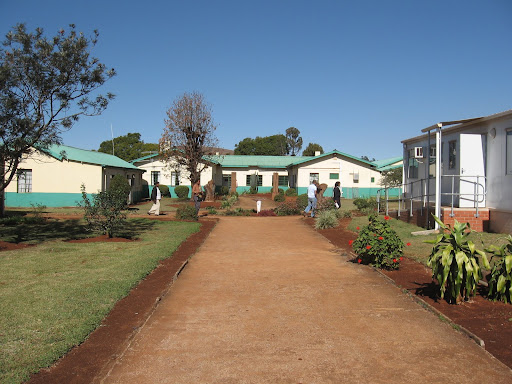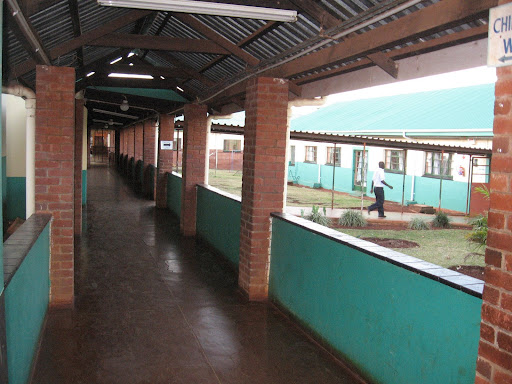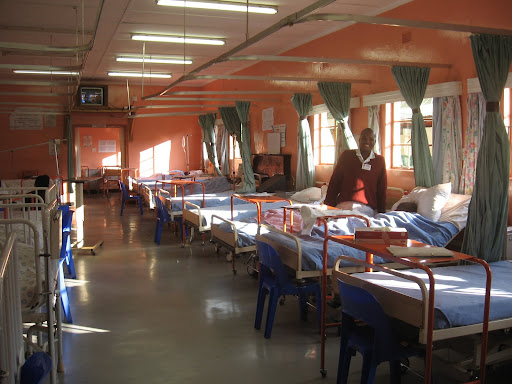 The sun is bright and the air cold as Hendy and I walk to the wards on Tuesday morning. We are, after all, approaching the depth of winter. We enter the central area of the hospital. Ceza is more compact than Hlabisa. It is an old mission hospital, founded in the late 40s. The lab, switchboard, offices and wards all open onto the same covered walkway. Hendy heads off to paeds, I head to the medical wards.
The sun is bright and the air cold as Hendy and I walk to the wards on Tuesday morning. We are, after all, approaching the depth of winter. We enter the central area of the hospital. Ceza is more compact than Hlabisa. It is an old mission hospital, founded in the late 40s. The lab, switchboard, offices and wards all open onto the same covered walkway. Hendy heads off to paeds, I head to the medical wards. Yesterday Dr Ndlovu, a physician at Thulasizwe TB hospital a few km down the road and in possession of the most dangly ear-rings I have ever seen, gave us a quick tour. The wards are only around a third full and it feels something of a ghost hospital – the word has been spread: there is no doctor at Ceza. Patients are going elsewhere. After our tour I dropped into the wards to introduce myself and ask if there were any problems – it had of course been 3 days since they were last seen. “No,” says Sister, “go home and rest. You can come tomorrow.”
Yesterday Dr Ndlovu, a physician at Thulasizwe TB hospital a few km down the road and in possession of the most dangly ear-rings I have ever seen, gave us a quick tour. The wards are only around a third full and it feels something of a ghost hospital – the word has been spread: there is no doctor at Ceza. Patients are going elsewhere. After our tour I dropped into the wards to introduce myself and ask if there were any problems – it had of course been 3 days since they were last seen. “No,” says Sister, “go home and rest. You can come tomorrow.”I walk onto female medical. Sister in-charge, a formidable lady with a tremendously loud voice, grabs my hand as I walk in. “Hauw Doctor! Thank you for coming. We will not let you go.” Judging from the strength of her grip she is not necessarily speaking metaphorically. “This nurse will help you.” With her other hand she grabs a hapless junior and throws them at me.

There are just under 20 patients. Some have been admitted by nurses over the weekend – presumably there was no doctor. They have written a line or two (“Difficulty in breathing for three days. Fever and cough. ?Pneumonia.”) and started basic treatment. Most of them were here last week and our colleagues from Hlabisa have assessed them and written plans. One poor 12 year girl has a pnuemothorax from old TB, another lady had a massive gaping wound in her left armpit (I could stick my fist in it if I was sick enough to try) after a private GP tried to do a lymph node biopsy and it became infected. She has big nodes in her neck as well – almost certainly TB. There are even a few patients with non-TB/HIV problems: hypertension, an elderly lady with confusion, an acute psychosis. The round take a couple of hours – I need to learn each patient. I waffle at the nurses, spouting a few facts.
“This lady probably has lactic acidosis – a condition that can occur with certain drugs used to treat HIV.” I say, perhaps a little pompously.
“Ah,” says Mr Buthelezi, the nurse I am going around with, “lactate is produced as a consequence of anaerobic respiration is it not?” I am a little startled. Mr Buthelezi – probably in his 40s - explains that he learned this when he went back to school recently in order to become a nursing student. He also learned the principles of fermentation “but I don’t do that anymore,” he says with a grin, “not since I gave myself to Jesus.”
Male ward is a little quicker and we are all done by 1pm. The hospital manager’s secretary phones me – lunch has been left for us in the office. We have a quiet afternoon in outpatients and all the work is finished by 4pm.
I could learn to like it here.
Comments